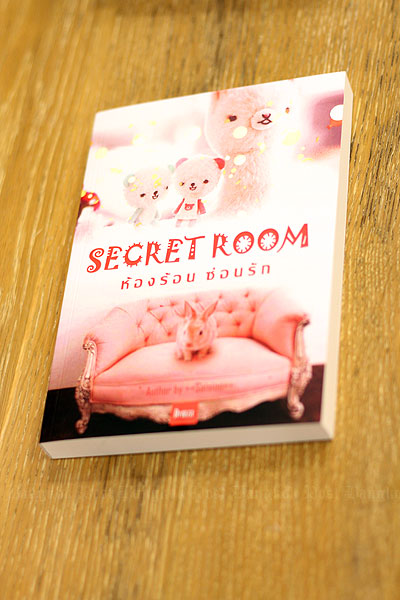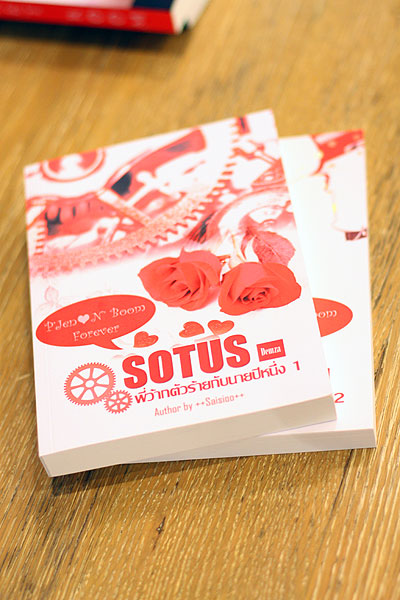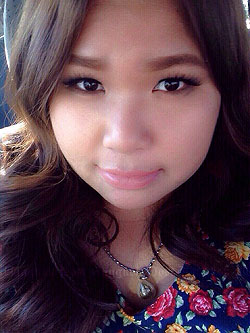
Young yaoi novelist finds success
By Suwitcha Chaiyong
Photos by Varuth Hirunyatheb
Did you know
Dem is working on a new heterosexual romance novel called Bad Romance.
Romantic novels about gay men have been popular with female readers for a long time. On the novel section of the popular www.dek-d.com website, homoerotic novels, known as yaoi, often attract up to 200,000 views.
Yaoi is a Japanese term used to describe a novel with romantic or sexual relationships between male characters. They are mostly written by female novelists and target female readers. Thai readers also call yaoi novels niyai wai (y-novels).
Thanutnun Vitsivakun (Dem), better known by her pseudonym ++saisioo++, is a popular yaoi author who has posted more than 14 novels on www.dek-d.com. The 22-year-old student’s first yaoi novel, Sorry, I'm Bad, was a great success, attracting more than 360,000 views online. The print version of the book also sold out. Dem’s other best-selling novels are Soul Mate, SOTUS (Seniority Order Tradition Unity Spirit) and Together with Me.
Dem believes that many young female readers like yaoi novels because the male characters in them have strong personalities.
“Female characters in romance novels are usually fussy and weak, and they overreact to misunderstandings, which can be really annoying,” Dem said. “But male characters in homoerotic novels hardly ever cry, and if they get into a fight, they fight back. They’re stronger than female characters.”
Student Weekly recently caught up with Dem to ask her about her writing and her popular books.

Student Weekly: Why did you initially decide to write yaoi novels?
Dem: My first novel was a romantic story about a heterosexual couple, but the feedback it got was mediocre. I was inspired to write yaoi after I read a fan fiction book written by my friend. Fan fiction is a style of homoerotic novel where the main characters are inspired by celebrities such as K-pop stars.
There were a lot of sweet and romantic stories being written, so I decided to write Sorry, I’m Bad, in which the main characters weren’t nice guys and the relationships are rough. I was really surprised when it became so popular.
Student Weekly: Where do you get your ideas for stories?
Dem: There are many different sources. Together with Me was inspired by the country song, “Rak Kham Klong (Romance on the Opposite Side of the Canal).” In Amphawa, Samut Songkhram, I saw people living along a canal, so I wrote the novel about close friends who live on opposite sides of a canal.
The idea for SOTUS came from a fan who told me about a popular hashtag on Twitter relating to a tough senior and a freshman.
Student Weekly: How do you create your characters?
Dem: A character can be inspired by people I know or a celebrity that I like. Sometimes I mix personalities I’ve seen with ideas from my imagination.

Student Weekly: How did you learn so much about what guys are like?
Dem: I used to study in an art school where I was only female student in the class. I observed the masculine personalities of my classmates. I also consulted my gay friends about my story ideas and made changes to make the stories more realistic.
Student Weekly: Where do you get ideas for the erotic scenes?
Dem: My friends recommended a website that features gay novels. After reading a lot of novels on the site I was able to create scenes with my own ideas.

Student Weekly: What has been your most impressive moment as a novelist so far?
Dem: I felt overwhelmed at the Fiction Market yaoi book fair when my fans brought me presents and food. My novels sold out in an hour. One fan also told me that a character in Be My Dear made her change her attitude. That made me realise that novels have the power to influence readers.
Student Weekly: What makes your novels different from others in the same genre?
Dem: I don’t do what everybody else does. When a lot of authors wrote novels about sheikhs in the desert, I didn’t do that. And while bad characters are usually masculine, I switched it around and made the female character bad. I had to come up with new details to make the characters seem real.

Student Weekly asked some young female readers to tell us what they like about yaoi novels.

“I used to be against the idea of yaoi, but then I decided to try reading one. I started by reading a fan fiction book, and it was actually very interesting and entertaining. I liked the idea of celebrities being couples in a fictional story. I then read several more fan fictions inspired by the same couple. I don’t think there’s any harm in these novels. They just come from the imagination of writers.”
Premsuda Khemkled (Mo),
22, university student

“I enjoy reading romantic comedy yaoi. Homoerotic books aren’t much different from heterosexual romance stories. The only difference is that the leading characters are the same gender.”
Srisuput Petchom, 22,
university student

“Three years ago, a novelist wrote a fan fiction book with members of a K-pop group that I liked as a couple. After that I started reading yaoi novels. The plots and characters are the most important things in any kind of novel. I like stories about investigations.
Jaranya Donsanuan,
18, high school student
Vocabulary
- homoerotic (adj): used to describe art, literature, etc. that relates to sexual desire for a person of the same sex
pseudonym (n): a name used by a person, especially a writer, instead of their real name
fussy (adj): too concerned or worried about unimportant details or standards
heterosexual (adj): a person who is sexually attracted to people of the opposite sex
mediocre (adj): not very good
masculine (adj): having the qualities or appearance considered to be typical of men
consult (v): to go to somebody for information or advice
sheikh (n): an Arab prince or ruler; the head of an Arab village, etc.


